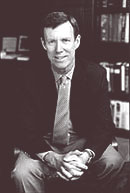 |
|||||||||
|
||||||||||||
An earthquake rattled Western Washington in February 2001 and, while reconstruction continues in some areas, the population fortunately didn’t suffer massive destruction or casualties from seismic forces. Now, however, our nation and our world face troubled times from human forces bent on destruction. Our colleagues on the Eastern Seaboard courageously faced the unimaginable, and academic medical centers across the country are preparing for threats to the health of the public that before Sept. 11 were equally unimaginable.
The roles of academic medical centers are to seek new knowledge for the betterment of human health, train professionals to prevent illness and care for the sick, educate new scientists to study the underlying processes essential to life, and to directly serve patients, especially those who cannot afford medical care. By remaining strong in these humanitarian endeavors, academic medical centers remain places of compassion in times of strife, and places of learning in times of uncertainty.
At the UW Academic Medical Center, we are always striving to improve our teaching, research and clinical programs. For example, this past May, the medical school’s curriculum revisions were approved for implementation. These revisions are the result of three years of curriculum review and deliberations. One of the primary goals of the curriculum review is to prepare physicians to adapt to rapid changes in scientific knowledge and medical practice. A solid foundation of clinical skills and effective mentoring relationships with faculty should enable UW medical students to practice wisely no matter what circumstances society may encounter in the years ahead. The UW School of Medicine is committed to graduating medical students who are well grounded in the disciplines underlying medical practice and who communicate professionally, compassionately, and effectively with their patients and colleagues.
The 2001 Dean’s Report also contains several examples of important contributions UW researchers have made to medical science. UW scientists have long been noted for their contributions to the understanding of ion channels, the activation of cellular processes, protein structure and protein interactions, genetics, vision, hearing, neurobiology, blood formation, resistance to infectious diseases, and injury prevention. The UW also has a growing reputation in genome sciences, neuromuscular diseases, informatics, neuroimaging, adult stem cell studies, nanotechnology, and gene therapy.
Newly opened centers and laboratories are fostering research in emerging fields. This past year the Gene and Cell Therapy Core Laboratory was added to the remodeled General Clinical Research Center at UW Medical Center. This laboratory is designed to bring advances in genetics and cellular biology to the treatment of diseases that cannot be cured with current therapeutic approaches. Another new facility used by a variety of researchers is the UW Center for Expression Arrays, which allows scientists to examine thousands of genes simultaneously, a technology essential to cancer studies, infectious disease research, and many other fields of investigation. Also created this year is a cooperative center for hepatitis C research to study this serious viral disease.
The research activities described in the 2001 Dean’s Report are only a sample of the many innovative research programs led by UW faculty. During fiscal year 2001, UW School of Medicine faculty received approximately $368 million in research grants from the National Institutes of Health (NIH).
In addition to leading advances in biomedical research and professional training, the UW Academic Medical Center and its WWAMI partners initiated new ways to educate the community. This past February the first UW Mini-Medical School was held in Seattle to acquaint local leaders and medical school supporters with important medical developments. The UW Health Sciences Center also hosted its first Minority and Health Disparities Fair for UW students and neighbors. Our WWAMI partners launched WIN the Rockies, a program to help residents of Wyoming, Idaho and Montana incorporate regular exercise and healthy diets into their daily lives.
These and many other research, patient care, education, and community service developments from the past academic year are covered in this report. The UW Academic Medical Center’s enduring strengths and its mission to serve the public will continue to bring forth many benefits for humanity in response to the needs of a changing world.
Paul G. Ramsey, M.D.
Vice President for Medical Affairs and Dean of the School of Medicine
University of Washington
|
| UW AMC Medical Center | UW School of Medicine | Harborview | UW MC | Search UW AMC | UW Home | Contact Us | ©2001-2002, University of Washington Academic Medical Center. All rights reserved. Please honor our copyrights. |
|
